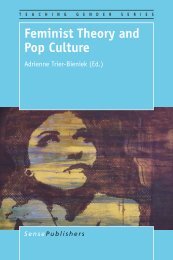TRANSCENDING DISCIPLINARY BOUNDARIESA REFLECTIVENESS / DEFENSIVENESS CONCEPTUAL FRAMEWORK:THE PROPOSED THEORETICAL FOUNDATIONThis section introduces the conceptual framework of reflectiveness <strong>and</strong> defensiveeness.A lay person’s view of the two is summarized first. A deeper analysis follows,after being set in context.Reflective vs. Defensive Responses: the Layperson’s ViewFrom the layperson’s perspective, reflectiveness <strong>and</strong> defensiveness are understoodas radically different from each other. Defensiveness is associated with an incidentspecificincrease in emotion that overshadows other aspects of an encounter <strong>and</strong>effectively prevents further discussion of the topic at h<strong>and</strong>; in shorth<strong>and</strong>, an ad hocreaction of: “NO, DON’T”. Reflectiveness is associated with diminishment ofemotional investment, a kind of long-term stepping back to see better; in shorth<strong>and</strong>,an attitude of: “Hmmm, I wonder...” Though widely held, these definitions byassociation do not provide any insight into the origins, operations, or mechanismsof reflectiveness <strong>and</strong> defensiveness. A deeper analysis follows.Setting Context: Diverse Sources <strong>and</strong> Multiple ValuesExtending a metaphor from Plack <strong>and</strong> Greenberg (Plack & Greenberg 2005 p. 3],<strong>learning</strong> comprises two main aspects, <strong>and</strong> can be likened to the double helix of DNA.One str<strong>and</strong> holds the cognitive content specific to a particular domain or discipline; itis acquired by cognitive effort, including memorization. One str<strong>and</strong>, the focus of thisproposal, is composed of context, meaning, <strong>and</strong> their interplay; it is acquired throughreflectiveness, a practice common to all fields of <strong>learning</strong>. As befits the crossdisciplinarynature of TC, for this paper I draw on literature from a number ofdisciplines <strong>and</strong> professions, all directed toward the second str<strong>and</strong> of <strong>learning</strong>.TC practice bespeaks an approach to teaching that is value-laden with respectto reflectiveness, because educators want students to respond reflectively.However, that value-laden orientation may blind one to the possibility of exploring<strong>and</strong> examining the absence of reflectiveness (a circumstance of many students’experience, <strong>and</strong> one that must be accounted for by any explanatory theory). Thus,(the search for) a theoretical foundation must take a value-neutral orientationregarding reflectiveness – <strong>and</strong> defensiveness: rather than being concerned withhow one can engender a particular (reflective) response, one explores how studentsactually do respond to existentially unfamiliar, educationally critical material withina discipline. Following Segal’s example (Segal 1999), this sort of exploration intheory produces information epistemologically prior to – <strong>and</strong> useful for – engenderingin practice the desired reflectiveness.Elements of Explication for Reflectiveness <strong>and</strong> DefensivenessThis subsection draws primarily on the work of three individuals to explore theroles of meaning <strong>and</strong> awareness: Jack Mezirow served as an Education DepartmentChair at Columbia University <strong>and</strong> reported on both his own research <strong>and</strong> a wide29
SCHWARTZMANspectrum of scholarship related to transformation theory (Mezirow 1991). JohnDewey (Dewey 1991) played a seminal role in the development of moderneducation practice <strong>and</strong> theory. Phenomenologist Aron Gurwitsch, a student ofHusserl, suggested that universal patterns of organization characterize fields ofconsciousness <strong>and</strong> inform the development of awareness (Gurwitsch 1964).Meaning. Meaning amounts to a coherent representation of experience, an interpretationthat occurs both prelinguistically <strong>and</strong> through language ... by processesinvolving awareness (Mezirow 1991, p. 4). Meaning arises out of experience, itcannot be arbitrarily imposed. Saliency of a group of data so that this group emerges<strong>and</strong> segregates itself from the stream [of experience] is a feature not introducedinto the stream, but yielded by the stream itself (Gurwitsch 1964, p. 31), (James1890). Dewey believes that the exercise of intelligence requires the existence ofmeaning; to grasp meaning constitutes the nerves of our intellectual life. ForDewey, individual <strong>learning</strong> may be defined as making meaning; what one caninterpret effectively, one underst<strong>and</strong>s both differentiated from <strong>and</strong> in relationshipwith its surrounding context (Dewey 1991, pp. 116, 117).Meaning frames. Meaning-making takes place under an orienting frame ofreference, a structure of assumptions within which one’s past experience assimilates<strong>and</strong> transforms new experience, ... a habitual set of expectations. I use the termmeaning frame for such structures, which embody the categories <strong>and</strong> rules thatorder new experience, shaping how we classify our encounters with the world:what we take in <strong>and</strong> how we act. They also dictate what we notice <strong>and</strong> what weignore by selectively determin[ing] the scope of our attention ... informed by anhorizon of possibility, ... to simplify, organize, <strong>and</strong> delete what is not salient insensory input ... <strong>and</strong> provide the basis for reducing complex inferential tasks tosimple judgments. Thus, they function as both lions at the gate of awareness <strong>and</strong>the building blocks of cognition (Mezirow 1991, pp. 49, 50). Thomas Kuhn (1996)introduced the term paradigm to describe the analogous structure(s) withinscientific communities of scholarship: a collection of unspoken expectations for,assumptions about, <strong>and</strong> model of relevant aspects of the world.Dewey states that [e]xplicit thinking goes on within the limits of what is impliedor understood, <strong>and</strong> describes the role of these ‘premises’, the grounds or foundations,in reasoning: the premises contain the conclusions <strong>and</strong> the conclusions contain thepremises. The importance of coherence as an organizing principle is embodied inthat relationship (Dewey 1991, pp. 81, 215). Meaning frames operate below thelevel of awareness, as an unarticulated, unconscious system of ideas. They inhabitthe realm of the unseen, taken-for-granted: The old, the near, the accustomed, isnot that to which but that with which we attend (Dewey 1991, p. 222).Meaning frames exist as dynamic entities. In the normal course of ourencounters with the world, meaning frames undergo continual refinement; one’sselective <strong>and</strong> conceptualizing faculties are persistently at work (Gurwitsch 1964,p. 30). Encounters with the world also occur outside that normal course: Deweyobserves that any aspect of the world, no matter how well known, may suddenly30
- Page 1 and 2:
EDUCATIONAL FUTURES: RETHINKING THE
- Page 3 and 4:
EDUCATIONAL FUTURESRETHINKING THEOR
- Page 5 and 6:
A C.I.P. record for this book is av
- Page 7 and 8:
TABLE OF CONTENTS10. Threshold Conc
- Page 9 and 10:
Pax Intrantibus Salus Exeuntibus. L
- Page 11 and 12:
LAND ET ALstudents experience diffi
- Page 13 and 14:
LAND ET ALModePreliminalLiminalPost
- Page 15 and 16:
LAND ET AL(Barker, 1991, p.184). Th
- Page 17 and 18:
LAND ET ALvariations arising from t
- Page 19 and 20:
LAND ET ALform of a model of concep
- Page 21 and 22:
LAND ET ALQuestions of intersection
- Page 24 and 25:
EDITORS’ PREFACEstudents bring to
- Page 26 and 27: EDITORS’ PREFACEconcepts in the f
- Page 28 and 29: EDITORS’ PREFACEIn the final illu
- Page 30 and 31: EDITORS’ PREFACEhence becomes a n
- Page 32 and 33: EDITORS’ PREFACElearning. This th
- Page 34 and 35: EDITORS’ PREFACEa lens or ‘way
- Page 36 and 37: EDITORS’ PREFACEHence learning is
- Page 38 and 39: EDITORS’ PREFACEthe Communitas, w
- Page 40 and 41: EDITORS’ PREFACEBuilding on these
- Page 42 and 43: EDITORS’ PREFACECousin, G. (2009)
- Page 44 and 45: DAVID PERKINSFOREWORDEntrance…and
- Page 46: FOREWORDMeyer, J.H.F., Land, R. & D
- Page 50 and 51: JULIE A. TIMMERMANS1. CHANGING OUR
- Page 52 and 53: CHANGING OUR MINDSKegan’s (1982)
- Page 54 and 55: CHANGING OUR MINDSKegan describes e
- Page 56 and 57: CHANGING OUR MINDSIn fact, Kegan an
- Page 58 and 59: CHANGING OUR MINDSat the epistemolo
- Page 60 and 61: CHANGING OUR MINDSMight a learner r
- Page 62 and 63: CHANGING OUR MINDSreveals an additi
- Page 64 and 65: CHANGING OUR MINDSBendixen, L. D.,
- Page 66: CHANGING OUR MINDSSibbett, C., & Th
- Page 69 and 70: SCHWARTZMANScholarship in liminalit
- Page 71 and 72: SCHWARTZMANTC: the entityThe term T
- Page 73 and 74: SCHWARTZMANA resource for teaching
- Page 75: SCHWARTZMANunprecedented to attract
- Page 79 and 80: SCHWARTZMANrupture and phenomenolog
- Page 81 and 82: SCHWARTZMANfield(s) of one’s cons
- Page 83 and 84: SCHWARTZMAN36DATA: PARTICULARS GIVI
- Page 85 and 86: SCHWARTZMANchallenge than interpret
- Page 87 and 88: SCHWARTZMANStrategies for Teaching:
- Page 89 and 90: SCHWARTZMANThey are redefined here
- Page 91: SCHWARTZMANLoder, J. (1981). The tr




